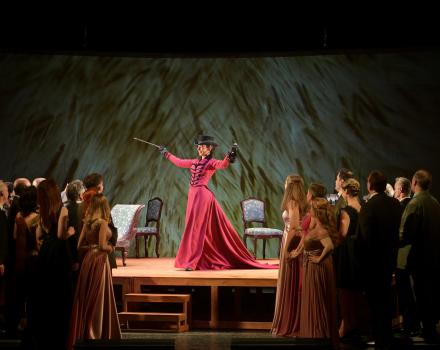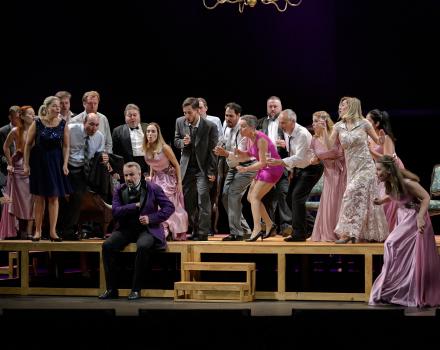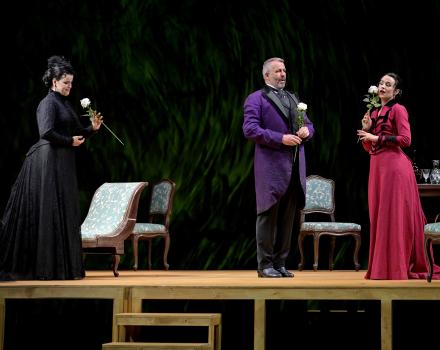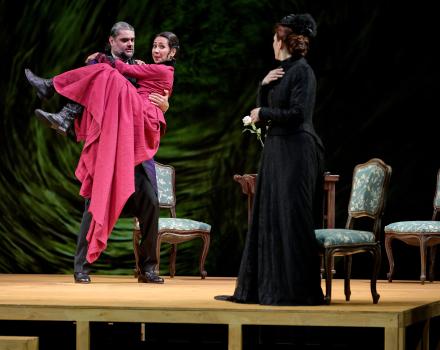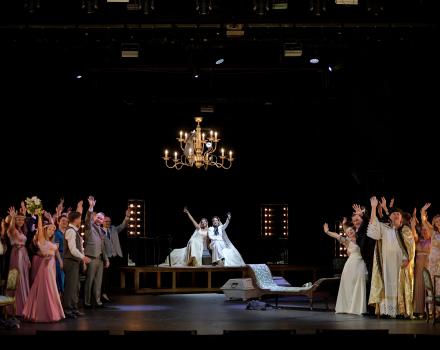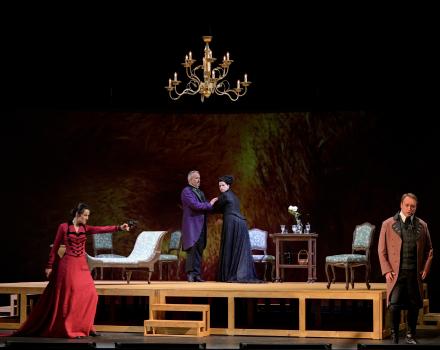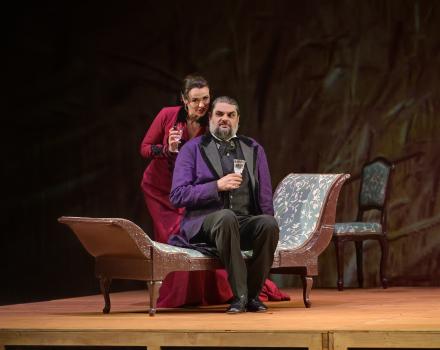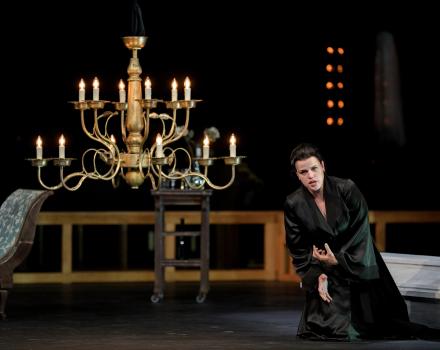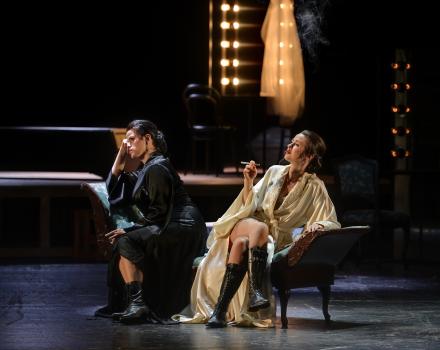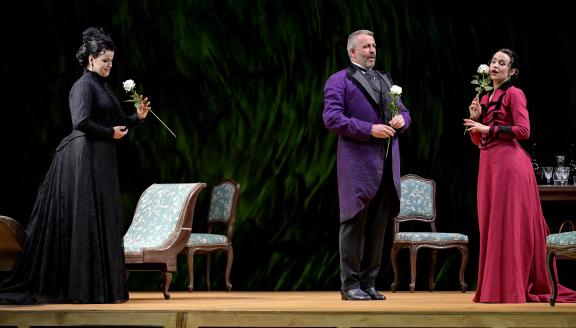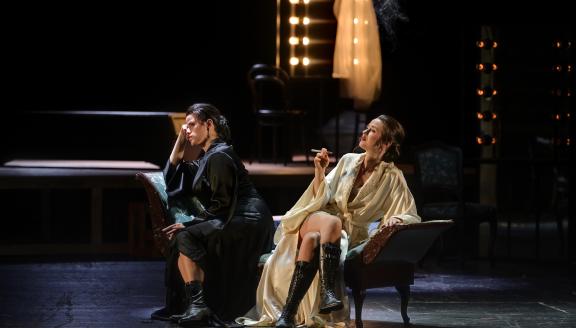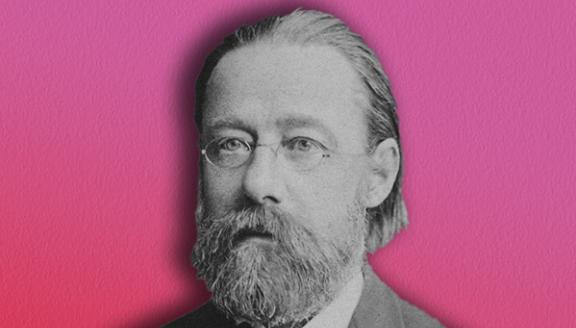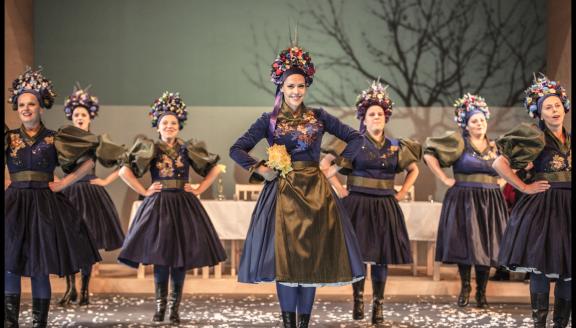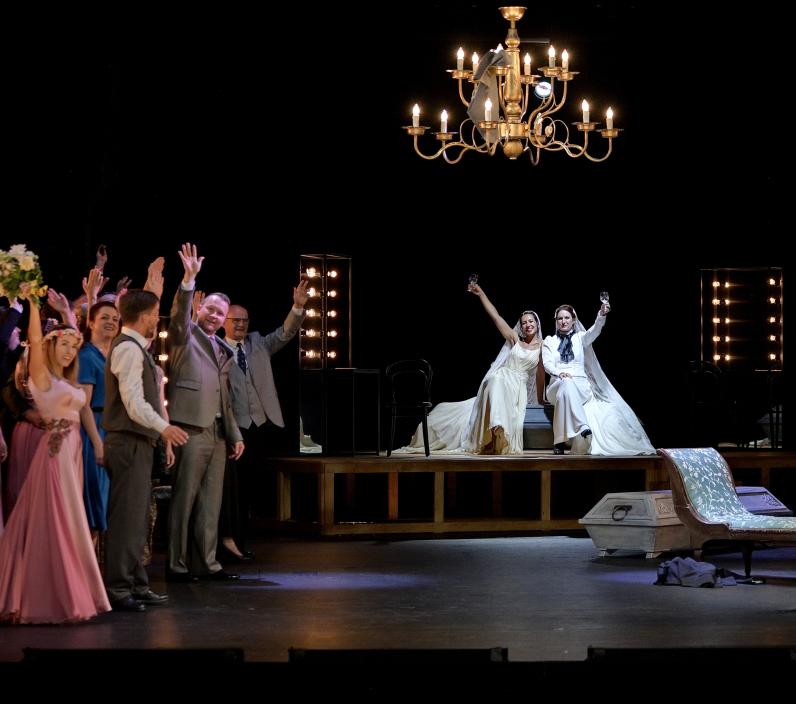
The Two Widows

The calm and peaceful lives of two young widows - cousins Karolina and Anežka, who live together on a countryside estate - is suddenly stirred up by an unexpected visitor. It becomes obvious that the mysterious poacher, who suddenly appears in the estate’s forest, is not out hunting for a doe but rather pining for one of them.
At the beginning of the 1870s, Smetana faced a rising number of challenges to his position of artistic director of Prague’s opera ensemble. From this tense and pressured period for the composer sprang a work of immense creative grace. He seems to delight in evoking a world of people of refined manners, fine culture and the gentle atmosphere of a rural estate. Perhaps it was a relief from life's difficulties and an escape from everyday dullness - a kind of summer fairy tale with a happy end. With The Two Widows, Smetana created a unique style of conversational opera, which Richard Strauss considered one of the best operas of 19th century. As an integral part of the Smetana Opera Cycle Ostrava 2024, the production was staged by Slovenian director and scenographer Rocc, who offers a rare non-Czech point of view on this lesser-known gem of the operatic repertoire.
CAST
Karolina | Lada Bočková |
|---|---|
Anežka | Veronika Rovná |
Ladislav Podhajský | Martin Šrejma |
Mumlal | Martin Gurbaľ |
Toník | Václav Čížek |
Lidka | Karolína Levková |
Priest | Petr Urbánek |
Orchestra | National Moravian‐Silesian Opera Orchestra |
Chorus | National Moravian-Silesian Opera Chorus |
| ... | |
Music | Bedřich Smetana |
|---|---|
Text | Emanuel František Züngel after Jean Pierre Félicien Mallefille |
Conductor | Marek Šedivý |
Direction & sets | Rocc |
Costumes | Belinda Radulović |
Movement director | Anna Knollová |
Chorus Master | Jurij Galatenko |
Dramaturg | Juraj Bajús |
| ... | |
VIDEO
STORY
Act I
On a beautiful morning, rural people come to invite their landowner Karolina to a harvest festival. The widowed and energetic Karolina spends her summer on her farm in the company of her cousin Anežka, who is also a widow. Karolina is confident, independent and takes care of her perfect farm. The broody Anežka tends to be apathetic and, contrary to Karolina’s belief, she thinks that as a widow she must live in seclusion. Mumlal, the gamekeeper, complains about a poacher who constantly disturbs the wildlife in his woods. Luckily, he cannot shoot and never hits his target. Anežka is startled by this as she quite possibly knows the identity of this disruptive poacher. Karolina is very amused by the gamekeeper’s lamentations, so she orders Mumlal to arrest the young man and bring him to her. This is exactly what happens and this man - Mr Ladislav Podhajský - is actually very happy to be arrested by Mumlal. On his walks in the woods, he had always hoped to meet Anežka, a woman he has secretly adored for many years now.
When Ladislav enters, Karolina quick-wittedly realises that Anežka is embarrassed. She feels the interesting connection between her cousin and the ‘poacher’. Without hesitation, she decides to reveal the secret, especially as Ladislav explains his wandering through the woods by comparing himself to a hunter who longs for the incarnated vision of an undine. Anežka, though moved by his ballad-like storytelling, is determined to remain calm and unbothered. Karolina starts to interrogate Ladislav. He reveals his identity and is ‘sentenced’ to spend half a day on the farm. Mumlal is unhappy about the kind treatment given to the offender. What gets to Mumlal even more is Lidka and Toník, an engaged couple, are intrigued by this unfamiliar gentleman. Finally, everyone unanimously agrees that ‘love is truly the gift of God!’
Act II
Ladislav is singing about spring, love and the poetry of life. Both women listen to him closely and Karolina implies to her cousin that one of them is lucky because Ladislav is interested in her. Anežka does not show her true feelings and refuses to acknowledge that she could be the one Ladislav wants. However, Karolina knows it and teases Anežka to make her jealous. She lies and tells her cousin that she will try to get Ladislav to fall in love with her.
Anezka does not allow herself to be happy again after her husband’s passing, but she does not want Ladislav to be with Karolina either. She ironically reminds her that not that long ago, she boasted about her independence and wanted no one to have control over her! When she is alone, Anežka reads a love poem written by Ladislav. When Ladislav approaches her, although surprised, she manages to hide the love note. Their conversation ends with Anežka telling Ladislav that she is awaiting the departure of an unwelcome visitor on the farm. Ladislav interrupts Anežka’s coldness by sharing that he has been in love with her for years, but he had no hope as she was married, so he only treasured the memories. Anežka is moved by his lyrical speech, yet tells Ladislav about her devotion to her deceased husband. Her rejection pushes Ladislav away again and he is not satisfied with her proposal of friendship. While Ladislav is leaving, Karolina takes him to see the dancing at the harvest festival. Anežka is left feeling doubtful about her situation and is tormented by unhappy thoughts.
Mumlal tells Anežka about how Karolina and Ladislav are enjoying the harvest festival and that she even kissed him! So now Anežka is the only role model for widows. But Mumlal’s chattiness suddenly feels both ridiculous and infuriating to her.
In the meantime, Karolina asks Ladislav to a feast and he accepts her invitation. Ladislav opens up to Karolina and shares that it was his love for Anežka that brought him to their beautiful woods. He says that he is the type of person that is used to living in a city despite owning a farm in the Bohemian Forest. Karolina fakes being offended and Ladislav gets on his knees and begs her for forgiveness for his invasion of the privacy of both ladies. At that exact moment, Anežka, who has been driven to jealousy, unexpectedly enters in her ball dress. She sees Ladislav at her cousin’s feet and assumes that he is proposing to her. The misunderstanding must quickly be resolved. Anežka is caught off guard and now explains to Karolina why she has been hiding her feelings towards Ladislav.
An engagement party must be planned for the happy couple.
Insights
In Bohemia of the late 1860s and early 1870s Dalibor, Smetana’s most recent opera on an epic subject matter, was received rather coolly. It was time then for the composer to return to lighter pather on which he had embarked with the 1866 success of The Bartered Bride; it was time to write another comic opera. Jean Félicien Mallefille’s one-act French comedy Les deux veuves (The Two Widows) of 1860 was performed in Prague on 25 August 1868 in a Czech translation by Emanuel Züngel, and it was Züngel who became the author of Smetana’s libretto. When setting it to music, Smetana chose the form of a French conversational opera with spoken dialogue and discrete musical numbers. Züngel expanded the original one-act play into two acts, giving the composer space for the music.
The Two Widows premiered at Prague Provisional Theatre on 27 March 1874 at a time when Smetana was also under fire for his management of the opera company (which was not always entirely unjustified), and in the autumn of that year the situation turned disastrous when he became completely deaf. Today, it is hard to understand how the ‘Wagnerian’ label attached to Dalibor was automatically applied to The Two Widows as well.
As with The Bartered Bride, Smetana was his own greatest critic and he reworked The Two Widows. He felt there was an imbalance between words and music, perhaps linked to a dissatisfaction with the singers’ speech as remarked by, among others, the critic in the Národní listy newspaper. In the second version, Smetana added a couple of young betrothed villagers Toník and Lidka to the original quartet of characters. The composer extended the first finale and added the trio of Toník, Lidka and Mumlal to Act 2. Ladislav, who did not have a major solo, was given the song ‘When May comes’ in the new version. The spoken dialogues were replaced with through-composed recitatives, with the only prose remaining in the scene where Ladislav interprets the contents of his letter to Anežka - as a recitation with musical accompaniment. By setting the recitatives to music, the character of the opera was transformed. The dramatic pace slowed down and the recitatives, though mostly of a parlando nature with minimal orchestral support, softened the sharp contrast between the spoken dialogue and the singing.
The opera premiered in this version on 15 March 1878. Despite the beauty of its musical component, The Two Widows was not spared the interference of other revisions, the results of which were eventually removed by Otakar Ostrčil’s staging in 1923 and in the version here from National Moravian-Silesian Theatre.
Gallery
